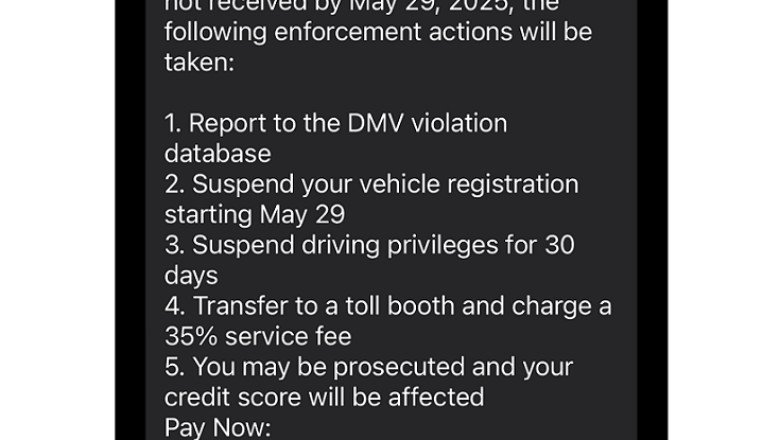
views
The Harrison County Sheriff’s Office and Sheriff Robert Matheny II recently issued a warning to area residents about a
The Harrison County Sheriff’s Office and Sheriff Robert Matheny II recently issued a warning to area residents about a scam in the area involving E-Z Pass. The following information was provided by Matheny’s office.
E-ZPass Scam: What You Need to Know:
The E-ZPass text message scam is a prevalent phishing scheme where scammers send text messages pretending to be from E-ZPass or other toll collection services, claiming you owe money for unpaid tolls. These messages typically include a link to a fake website that steals your personal and financial information.
Here’s how to spot and avoid the E-ZPass scam:
1. How to Spot a Scam Text:
• Unexpected Text Messages: Be wary of unsolicited text messages from unknown numbers claiming to be from E-ZPass.
• Urgent Language and Threats: Scam texts often use urgent language and threaten consequences like fines or license suspension if payment isn’t made immediately.
• Suspicious Links: Scam texts will include a link to a website that may look official but is actually a phishing site.
• Requests for Personal Information: Legitimate toll agencies will never ask for sensitive information like your credit card number or Social Security number via text message.
• Generic Greetings: Scam texts may use generic greetings like “Dear Customer” instead of your name.
• Typos and Grammatical Errors: Scam texts often contain typos and grammatical errors.
• Out-of-State or Foreign Phone Numbers: If the text comes from an out-of-state or international number, it’s likely a scam.
2. What to Do If You Receive a Suspicious Text:
• Do Not Click the Link: Never click on any links in a suspicious text message.
• Do Not Reply: Avoid replying to the text message or engaging with the sender.
• Report the Scam: Report the scam text to the E-ZPass Customer Service Center and the Internet Crime Complaint Center (IC3) (https://www.ic3.gov/).
• Delete the Text: Delete the text message from your phone.
• Block the Sender: Block the sender’s number to prevent future scam attempts.
• Verify Your Account: If you’re concerned about unpaid tolls, check your E-ZPass account directly through the official website or app.
3. What to Do If You’ve Been Scammed:
• Contact Your Bank: If you provided any financial information, contact your bank immediately to report the scam and potentially freeze your account.
• Change Your Passwords: Change your passwords for your E-ZPass account, bank accounts, and other online accounts.
• Monitor Your Accounts: Keep a close eye on your bank and credit card statements for any unauthorized activity.
• Report the Scam: Report the scam to the Federal Trade Commission (FTC) (https://reportfraud.ftc.gov/) and the Internet Crime Complaint Center (IC3) (https://www.ic3.gov/).
Remember: If you receive a text message about an unpaid E-ZPass toll, don’t panic. Take a moment to assess the situation and look for red flags. It’s always better to err on the side of caution and avoid clicking any links or providing personal information.

























Comments
0 comment